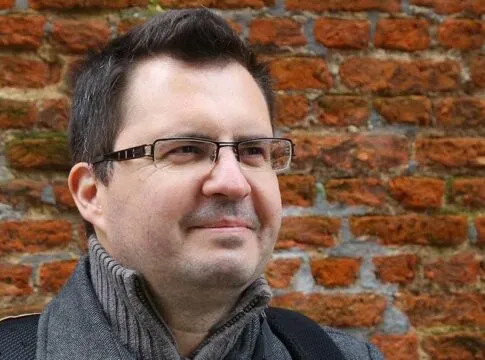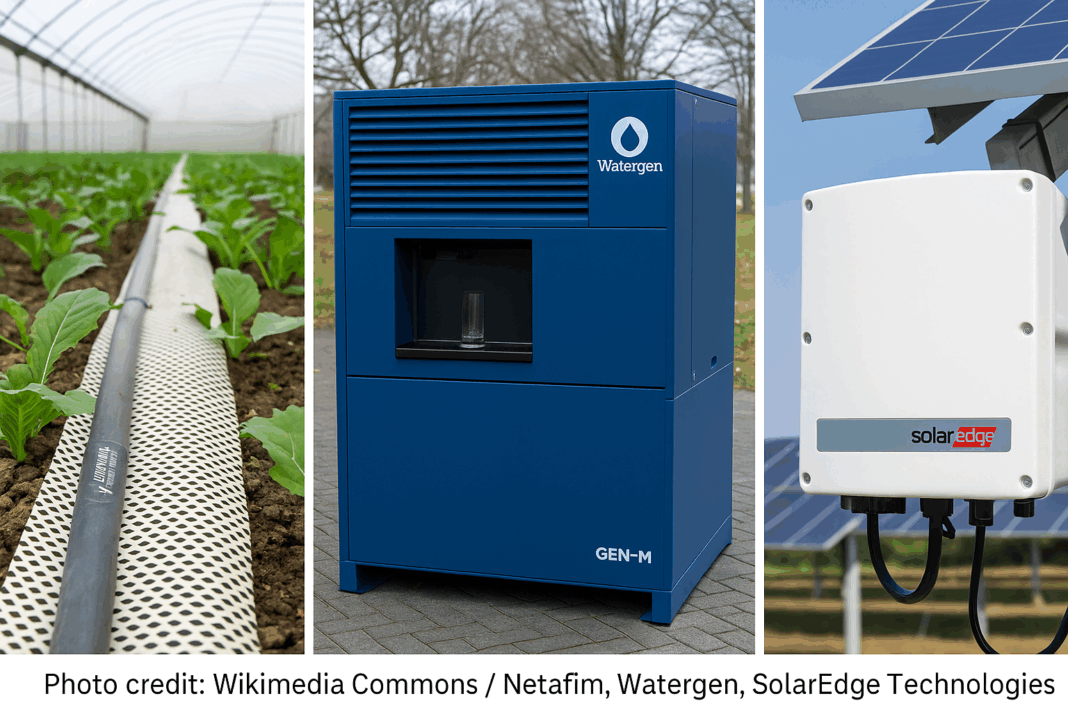Israel, often called the “Start-Up Nation,” is one of the world’s leaders in finding technical innovative solutions to tackle pressing global challenges—most notably water scarcity and the need for renewable energy—making significant contributions to multiple UN Sustainable Development Goals (SDGs).
By Roman Yanushevsky
Tel Aviv(INPS Japan) – Israel has earned the title of “Start-Up Nation” thanks to its vibrant innovation ecosystem, but in recent years many Israeli ventures have shifted their focus toward solving some of the world’s most pressing challenges. Rather than limiting their scope to profit-driven technologies, a growing number of start-ups are aligning their products with the United Nations’ Sustainable Development Goals (SDGs), tackling global issues such as water scarcity, food security, and renewable energy. This evolution underscores how Israeli entrepreneurship is expanding its impact far beyond the borders of the country.(P-11)|RUSSIAN|JAPANESE|
Watergen

One prominent area of innovation is water technology. Companies like Watergen, which developed devices capable of generating clean drinking water from air, directly address SDG 6 (Clean Water and Sanitation).
Founded in 2009 by entrepreneur Arye Kohavi, Watergen develops atmospheric water generators (AWG) that extract potable water from air—using just 250 Wh per liter. Originally designed to supply troops, the technology has expanded to civilian use in regions suffering water shortages, including disaster zones and remote areas across the Americas, Asia, and Africa.
These solutions offer immediate relief in regions where access to safe water remains scarce. Such initiatives show how Israeli innovation can transform local humanitarian conditions while contributing to long-term resilience.
In 2020, Watergen deployed a unit in a Gaza pediatric hospital in collaboration with local utilities, demonstrating the applicability of its technology in humanitarian crises.
Netafim
Netafim, founded in Israel in 1965, is widely recognized as the pioneer of modern drip irrigation technology. The company was born in the Negev desert, where water scarcity pushed engineers and farmers to search for smarter ways to grow crops with minimal resources.
Their invention of drip irrigation—delivering precise amounts of water and nutrients directly to the plant’s root zone—revolutionized agriculture, setting a new standard for efficient farming practices worldwide.
The technology developed by Netafim helps farmers save up to 60% of water compared to traditional irrigation methods, while also increasing crop yields significantly. By reducing water loss from evaporation and runoff, drip irrigation ensures that every drop counts. This approach directly supports sustainable agriculture, especially in regions facing drought and climate change, where water is one of the scarcest resources.
The company operates in over 110 countries and works with smallholder farmers as well as large agricultural enterprises. In India, Netafim has partnered with government programs to provide affordable drip irrigation systems to millions of farmers, helping them grow more food on less land. In Africa, their technologies have been deployed to support food security projects, allowing farmers in Kenya and South Africa to cultivate crops even in semi-arid conditions.
In Latin America, countries such as Brazil and Mexico have adopted Netafim’s systems to support the cultivation of coffee, sugarcane, and vegetables, where efficient irrigation is critical for both productivity and sustainability. Similarly, in Australia and the United States, Netafim’s technology has been applied to vineyards and orchards, helping growers improve the quality of grapes, citrus fruits, and nuts while conserving scarce water resources.
Today, Netafim is considered a global leader in smart irrigation solutions, aligning its mission with the United Nations Sustainable Development Goals (SDGs), particularly SDG 2 (Zero Hunger) and SDG 6 (Clean Water and Sanitation). By providing tools that empower farmers worldwide to grow more with less, the company not only addresses food security but also promotes sustainable water management. Netafim’s legacy demonstrates how Israeli innovation continues to shape the future of agriculture for the benefit of communities across the globe.
Tethys Solar Desalination (TSD)
This Israeli start-up company has developed a breakthrough technology that uses solar energy to desalinate seawater in an affordable, sustainable, and scalable way. Unlike traditional desalination plants, which rely on fossil fuels and are costly to maintain, TSD’s system runs entirely on renewable energy, reducing both operational costs and carbon emissions.
At the core of TSD’s innovation is its solar-powered desalination module, which mimics natural evaporation and condensation. Sunlight heats seawater in a specially designed unit, causing it to evaporate. The vapor then condenses into fresh, drinkable water, while the remaining brine is safely discharged. This low-cost, off-grid technology can be deployed in coastal communities and arid regions where access to clean water is scarce and infrastructure is limited.
The company’s solution is particularly relevant for developing countries that face severe water stress but lack the financial resources for conventional desalination. TSD systems are modular and scalable, meaning they can serve anything from a small fishing village to a large municipality. For example, the technology has been tested in regions of Africa and Asia, where water shortages impact both households and agriculture. By providing a decentralized, affordable source of fresh water, TSD helps communities achieve greater self-sufficiency.
TSD’s impact aligns with several UN Sustainable Development Goals (SDGs), including SDG 6 (Clean Water and Sanitation), SDG 7 (Affordable and Clean Energy), and SDG 13 (Climate Action). By using the sun as a free and abundant resource, the company not only reduces dependence on fossil fuels but also addresses climate resilience in areas most vulnerable to droughts and water scarcity.
SolarEdge

SolarEdge, founded in 2006 in Israel, has become a global leader in smart energy technology, best known for its innovative solar inverters and energy management systems. The company revolutionized the solar industry by introducing the DC-optimized inverter system, which allows each solar panel to operate independently at maximum efficiency. This breakthrough solved one of the biggest challenges in solar power—energy loss caused by shading or panel mismatch.
Beyond inverters, SolarEdge has expanded into a full suite of clean energy solutions, including energy storage, electric vehicle (EV) charging, backup power, and smart home energy management. By integrating hardware and software, SolarEdge enables households, businesses, and utilities to monitor and control their energy production and consumption in real time. This contributes to reducing electricity costs while increasing energy independence and resilience.
Globally, SolarEdge technology is deployed in over 130 countries, from large solar farms in Europe and the United States to residential rooftops in Asia and Africa. In the United States, SolarEdge is a top provider of residential solar inverters, helping millions of households lower their carbon footprint. In Europe, its systems power commercial buildings and schools, while in developing regions the company supports rural electrification projects, bringing clean energy to communities with limited grid access.
SolarEdge also plays a vital role in advancing renewable energy integration into power grids. With smart energy management and grid services, the company helps utilities stabilize electricity networks and manage growing renewable energy flows. This is especially critical as countries aim to meet climate targets and transition away from fossil fuels. By supporting grid flexibility, SolarEdge contributes directly to the UN Sustainable Development Goals, particularly SDG 7 (Affordable and Clean Energy) and SDG 13 (Climate Action).
Looking ahead, SolarEdge continues to invest in digitalization and AI-driven energy solutions. Its vision is not just to generate renewable energy but to create an intelligent ecosystem where solar, storage, EVs, and smart devices work together seamlessly. Through innovation and global reach, SolarEdge is making clean energy more efficient, accessible, and reliable—helping drive the world toward a sustainable future.
H2Pro
H2Pro is an Israeli company revolutionizing the production of green hydrogen, a clean energy source that can play a critical role in the global transition away from fossil fuels. Founded in 2019 as a spin-off from the Technion – Israel Institute of Technology, H2Pro developed an innovative technology called E-TAC (Electrochemical-Thermally Activated Chemical water splitting), which makes hydrogen production significantly more efficient and cost-effective compared to traditional electrolysis.
Unlike conventional electrolysis, which splits water into hydrogen and oxygen simultaneously, H2Pro’s E-TAC process separates the two stages. This unique approach improves efficiency, lowers electricity consumption, and reduces costs, all while ensuring greater safety by avoiding the immediate mixing of gases. As a result, H2Pro is able to produce green hydrogen at a price competitive with fossil-fuel-based alternatives, making the technology highly attractive for large-scale adoption.
Green hydrogen produced by H2Pro has the potential to decarbonize multiple industries, including transportation, heavy manufacturing, and energy storage. It can serve as a clean fuel for trucks, ships, and airplanes, as well as a critical component in producing green steel and fertilizers. By offering a scalable and affordable solution, H2Pro contributes directly to reducing greenhouse gas emissions and supporting the global shift to net-zero economies.
With strong backing from investors such as Bill Gates, Hyundai, and ArcelorMittal, H2Pro is already expanding partnerships worldwide. Its technology is being tested in Europe, Asia, and North America, where governments and industries are prioritizing hydrogen as part of their renewable energy strategies.
By combining Israeli innovation with global demand for clean solutions, H2Pro positions itself at the forefront of the hydrogen economy, aligning with UN Sustainable Development Goals (SDGs) such as affordable clean energy, climate action, and sustainable industry.
Summary
Overall Israel hosts nearly 1,300 climate-oriented companies, including 946 startups focused on clean energy, water infrastructure, eco-agriculture, sustainable mobility, novel materials, and more. Government grants, programs like PLANETech, and academic investments totaling over $130 million further reinforce innovation and environmental sustainability.
Israeli startups are advancing critical global initiatives—addressing SDG 6 (Clean Water and Sanitation) and SDG 7 (Affordable and Clean Energy)—through tangible, scalable technologies. From extracting water from air and powering micro-grids to producing green hydrogen and innovative energy storage, Israel’s “Start-Up Nation” is contributing meaningful solutions to complex global challenges, forging pathways toward a more sustainable future.
This article is brought to you by INPS Japan in partnership with Soka Gakkai International, in consultative status with UN ECOSOC.




